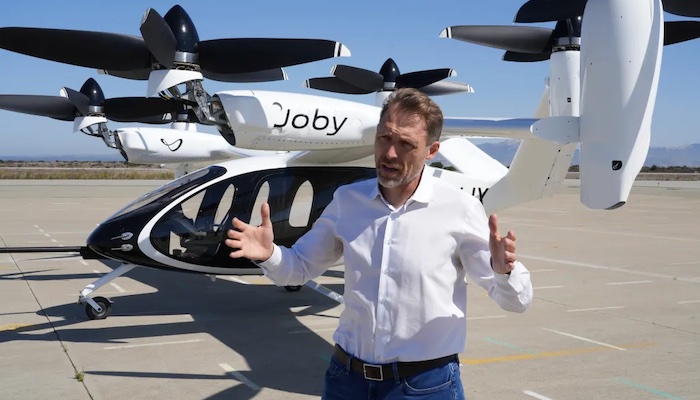
JoeBen Bevirt of Joby Aviation Moves Towards His Dream of Electric Flying Taxis
JoeBen Bevirt began to entertain fantasies regarding aerial vehicles that could transport him to his destination in a matter of minutes. During his childhood, he endured lengthy, monotonous journeys between destinations.
JoeBen Bevirt began to entertain fantasies regarding aerial vehicles that could transport him to his destination in a matter of minutes. During the 1980s, he was a child who made lengthy, tedious trips between his school and his wooded home in the mountains.
Bevirt, the CEO of Joby Aviation, is on the brink of transforming his childhood fantasies into a reality as he and contemporary variations of the Wright Brothers introduce a new category of electric-powered aircraft that are competing to become sky taxis.
The “electric vertical take-off and landing vehicle” (eVTOL) is an aircraft that operates similarly to a helicopter, launching from the ground and achieving velocities of up to 200 miles per hour (322 kilometers per hour) with a range of approximately 100 miles (161 kilometers).
Additionally, these aircraft accomplish this without contributing to the excessive pollution levels that are generated by fuel-powered helicopters and small airplanes.
“The finish line is within reach.” Before a Joby air taxi departed on a demonstration flight in Marina, California, which is approximately 40 miles south of his hometown in the mountains, Bevirt, 51, stated to The Associated Press, “We aim to reduce the current one- and two-hour trips to five minutes.”
Archer Aviation, a Silicon Valley company that is supported by United Airlines and Stellantis, has been conducting its own eVTOL tests over farmland in Salinas, California. In November of last year, a prototype named “Midnight” was observed gliding above a tractor plowing fields.
The tests are a component of the journey that Joby Aviation and other ambitious companies, which have collectively raised billions of dollars, are undertaking to transform flying cars into more than just fanciful concepts that were popularized in the 1960s-era cartoon series “The Jetsons” and the 1982 science fiction film “Blade Runner.”
Archer Aviation and Wisk Aero, which are located in the vicinity, are also at the forefront of the competition to introduce air taxis in the United States. These companies are affiliated with Boeing Co., an aerospace behemoth, and Larry Page, a co-founder of Google. Joby has already established a partnership to facilitate the connection of its air taxis with Delta Air Lines passengers, while Archer Aviation has secured a contract to deliver up to 200 of its aircraft to United Airlines.
The US Federal Aviation Administration has recently established a new aircraft category known as “powered lift” as a result of the regulatory inroads that flying taxis have made. This is a step that the agency has not taken since helicopters were introduced for civilian use in the 1940s.
However, there are additional regulatory obstacles that must be resolved before air taxis are permitted to transport passengers in the United States. Consequently, Dubai is the most probable location for eVTOLs to conduct commercial flights by the end of the year.
Alan Lim, director of Alton Aviation Consultancy, a company that monitors the industry’s development, has described the process of creating a new class of vehicles as “tricky.” “The situation will resemble a crawl, walk, and run.” At present, I believe that we are still in the process of crawling. In the next two to three years, we will not experience a reality akin to the Jetsons, in which everyone is able to fly around.
China is also competing to make flying cars a reality, a pursuit that has aroused the interest of President-elect Donald Trump in prioritizing the vehicles during his incoming administration over the next four years.
Within the next few years, individuals will be able to take an air transportation to and from airports serving New York and Los Angeles if the aspirations of eVTOL pioneers are realized in the United States.
Joby anticipates that its electric taxis will be capable of transporting up to four Delta Air Lines passengers from New York area airports to Manhattan in approximately 10 minutes or less due to their ability to travel at high velocities without obstruction. Initially, the cost of air taxis will be significantly higher than that of a cab or Uber ride from JFK airport to Manhattan. However, the disparity may diminish over time due to the fact that eVTOLs are capable of transporting a greater number of passengers than ground vehicles that are ensnared in traffic on both sides.
Archer Aviation CEO Adam Goldstein anticipated during an interview at the company’s headquarters in San Jose, California, that “highways will be visible in the sky.” “The manner in which cities are constructed will be significantly altered by the presence of hundreds, if not thousands, of these aircraft flying through these cities.”
In late 2018, Archer was able to raise an additional $430 million from a group that included Stellantis and United Airlines, as investors are wagering that Goldstein is correct. The infusion occurred shortly after a Japanese automaker invested an additional $500 million in Joby, bringing its total investment in the company to nearly $900 million.
Alton Aviation reports that these investments were a component of the $13 billion that eVTOL companies have raised over the past five years.
In 2021, Joby Aviation and Archer Aviation both went public through reverse mergers, which provided an additional fundraising opportunity and facilitated the recruitment of engineers by appealing to the allure of stock options. In Archer’s case, the company has been able to recruit employees from Wisk Aero, as well as from Tesla, an electric automaker and SpaceX, a rocket manufacturer.
In a dispute that was resolved with a 2023 settlement that included an agreement for the two parties to collaborate on some facets of eVTOL technology, the Wisk defections triggered a lawsuit accusing Archer of intellectual property theft.
Joby also acquired eVTOL technology developed by ride-hailing service Uber in a $83 million agreement before going public. This deal also brought the two companies together as partners.
However, the accumulation of losses at the companies that are developing flying vehicles has not been impeded by any of the agreements or technological advancements. Since its commencement in 2009, Joby, which was founded by Bevirt, has incurred $1.6 billion in losses, while Archer has accumulated nearly $1.5 billion in losses since its inception in 2018.
Joby and Archer are currently in the process of negotiating contracts to utilize their eVTOLs in the US military for short-range missions and deliveries, in addition to transitioning to commercial air transportation services. In order to secure contracts, Archer has established a partnership with Anduril Industries, a military defense technology specialist that was established by Palmer Luckey, the inventor of the Oculus headgear.
Both companies have comparatively low market values by tech industry standards, with Joby’s valued at approximately $7 billion and Archer’s valued at $6 billion, due to the uncertain prospects.
However, Bevirt anticipates clear skies. He stated that “eVTOLs are going to revolutionize the way we travel.”
“It is a significantly superior method of transportation.” “Overlooking the world from the air is preferable to being ensnared in traffic on the interstate.”
All Categories
Recent Posts
Tags
+13162306000
zoneyetu@yahoo.com



